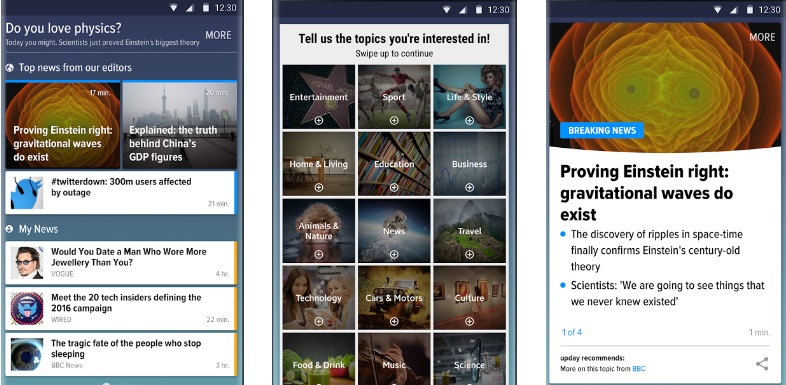Progress report: Axel Springer news aggregator Upday is ‘holding its own’

March saw the official launch of Upday, the news aggregating joint venture between Samsung and Axel Springer, designed so publishers can wrest back some control from platform players. While the unique-user numbers are growing, they’re not big enough to make a meaningful impact on the publisher’s bottom line.
Upday is an Android app and comes pre-installed on the latest Samsung devices, the Galaxy S7, and aggregates news from the RSS feed of 1,200 publishers, including The Daily Telegraph, BBC News, Le Figaro, Der Spiegel and Axel Springer publications. Content is separated into two buckets, “need to know” information, picked by local editorial teams, and “want to know” information, which is served via an algorithm tailored to individual tastes.
So far, Upday claims its growth is ahead of targets, although managing director Robin Hough, formerly head of the Guardian’s Tech and Media network, was unable to share specific numbers. Upday’s unique daily users doubled over the month during the Brexit vote, according to comments in July from Hough. But Upday hasn’t revealed the number of users.
“We haven’t seen the drop-off,” Hough told Digday. “We’ve been able to maintain and grow that level of user activity, and we see no sign of slowing up. Once people are aware of Upday, they see the utility.”
This tallies with data from analytics firm App Annie, which shows that in July the number of global monthly unique users was its highest at 250,000, (Upday’s internal figure puts this closer to 3 million). Since a spike in users in March, when the Samsung model was released, numbers haven’t dropped off, although App Annie was unable to reveal any other exact figures.
“It’s not reaching the rocky heights of the most popular news apps,” said Sam Cheney, senior market analyst at App Annie, “but it’s holding it own. News is such a crowded place, and Upday is sitting quite comfortably with other mid-sized players.”
“A quick glance at the U.K. news app landscape shows rate of downloads has slowed, but in general people are spending between two and three minutes a day with an app, which has doubled from a year ago,” added Cheney. “Upday is not a million miles away from this.”

Although the possible catchment for Upday is small, it’s only available for Android users and in four territories: the U.K., France Poland and Germany, where it has local teams of about seven people, apart from Germany which has roughly 70.
Upday’s proposition is that it offers a human editorial slant as well as the algorithm-served content based on preferences. Clearly, the human-and-algorithm model to news aggregation needs tweaking. Facebook, which was criticized for the bias of its editors in choosing which stories to surface, axed its trending-topics news team and since has had fake articles trending on the site. But as Ilicco Elia, head of mobile at DigitasLBi, notes, there are other news products that offer human curation: Apple News and Twitter have regional editorial teams to give a local flavor to content.
“Having that quick and easy access to news is something all platforms now have to offer,” said Elia, “Knowing you only have to go to one place and it’s automatically and constantly up to date, it increases the value of the complete Samsung ecosystem and is a reason for people to continue their mobile contract.”
On the flip side, some actively avoid buying Android devices because, depending on the carrier, they are more likely to come bloated with pre-installed apps, compared to Apple’s closed ecosystem. And pre-installation is not a proxy for use.
Upday’s other key difference is the ads. Currently, its serves an ad every 10th Upday card, but it is planning to increase the number of formats soon without overloading the experience. Ads can’t be blocked and are traded by local Upday’s local sales teams.
Also, it plans to pay publishers 5 percent of the ad revenue that the platform earns depending on the specific country’s law. Axel Springer has been siphoning off revenues into a royalty pool before it makes money. The publishing house has had a checkered history with Google for displaying the snippets of text under an article in Google Search, so it makes sense that it would offer remuneration for aggregating.
More in Media

In Graphic Detail: The scale of the challenge facing publishers, politicians eager to damage Google’s adland dominance
Last year was a blowout ad revenue year for Google, despite challenges from several quarters.

Why Walmart is basically a tech company now
The retail giant joined the Nasdaq exchange, also home to technology companies like Amazon, in December.

The Athletic invests in live blogs, video to insulate sports coverage from AI scraping
As the Super Bowl and Winter Olympics collide, The Athletic is leaning into live blogs and video to keeps fans locked in, and AI bots at bay.





